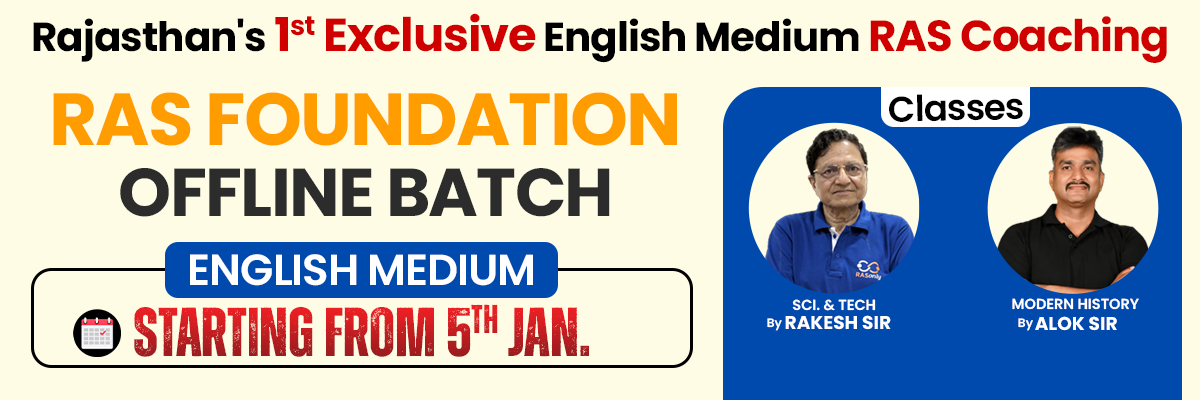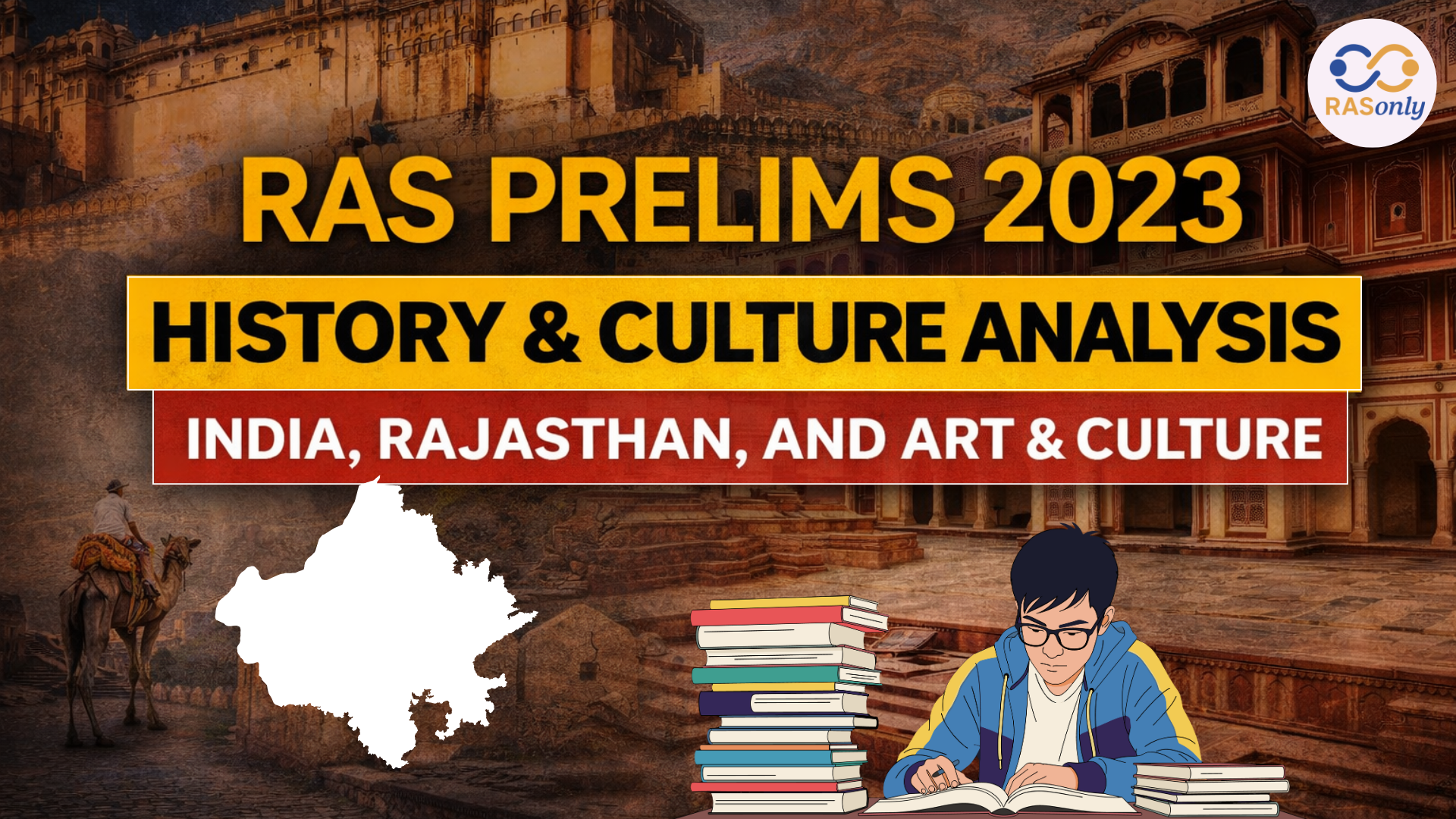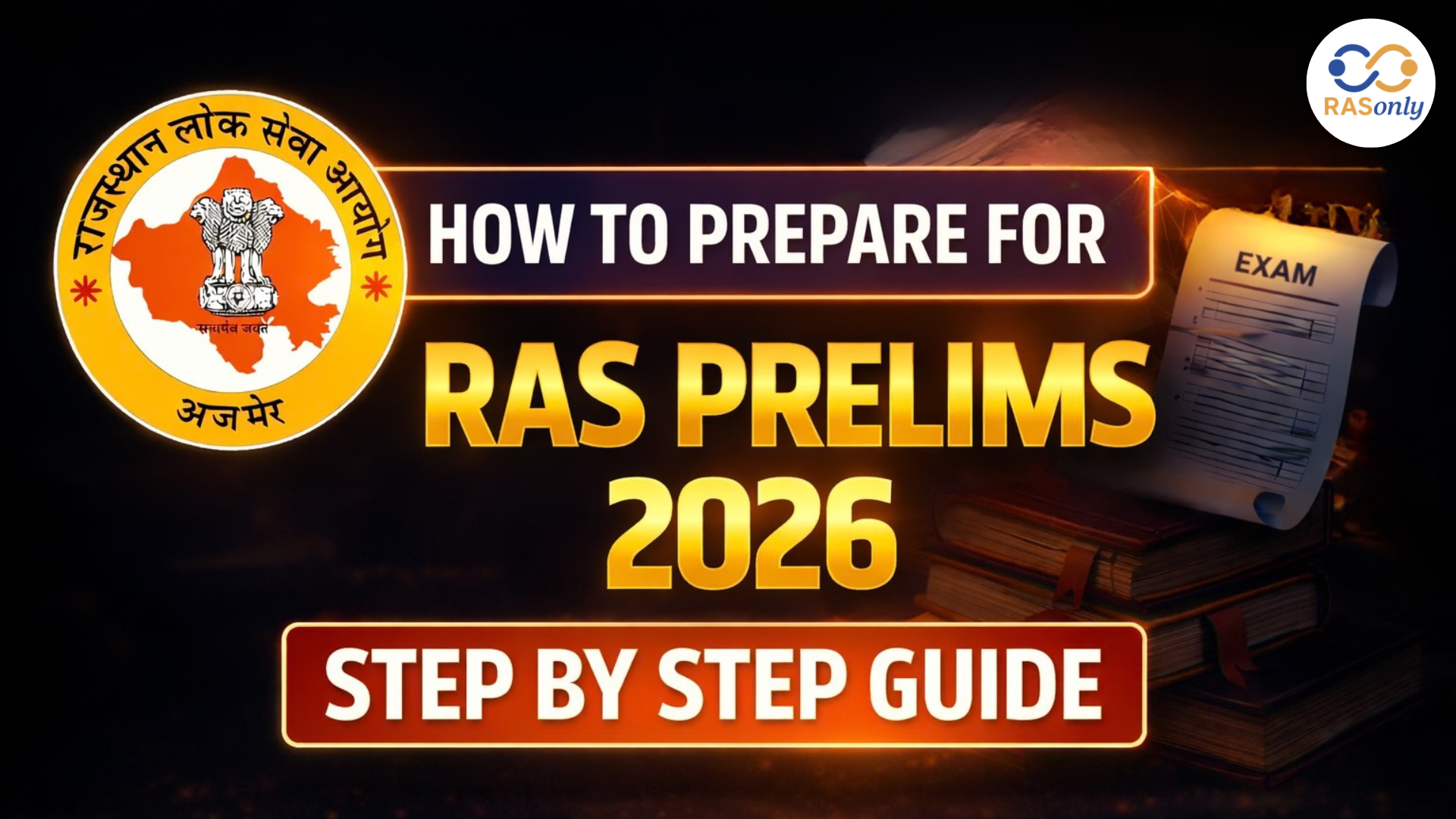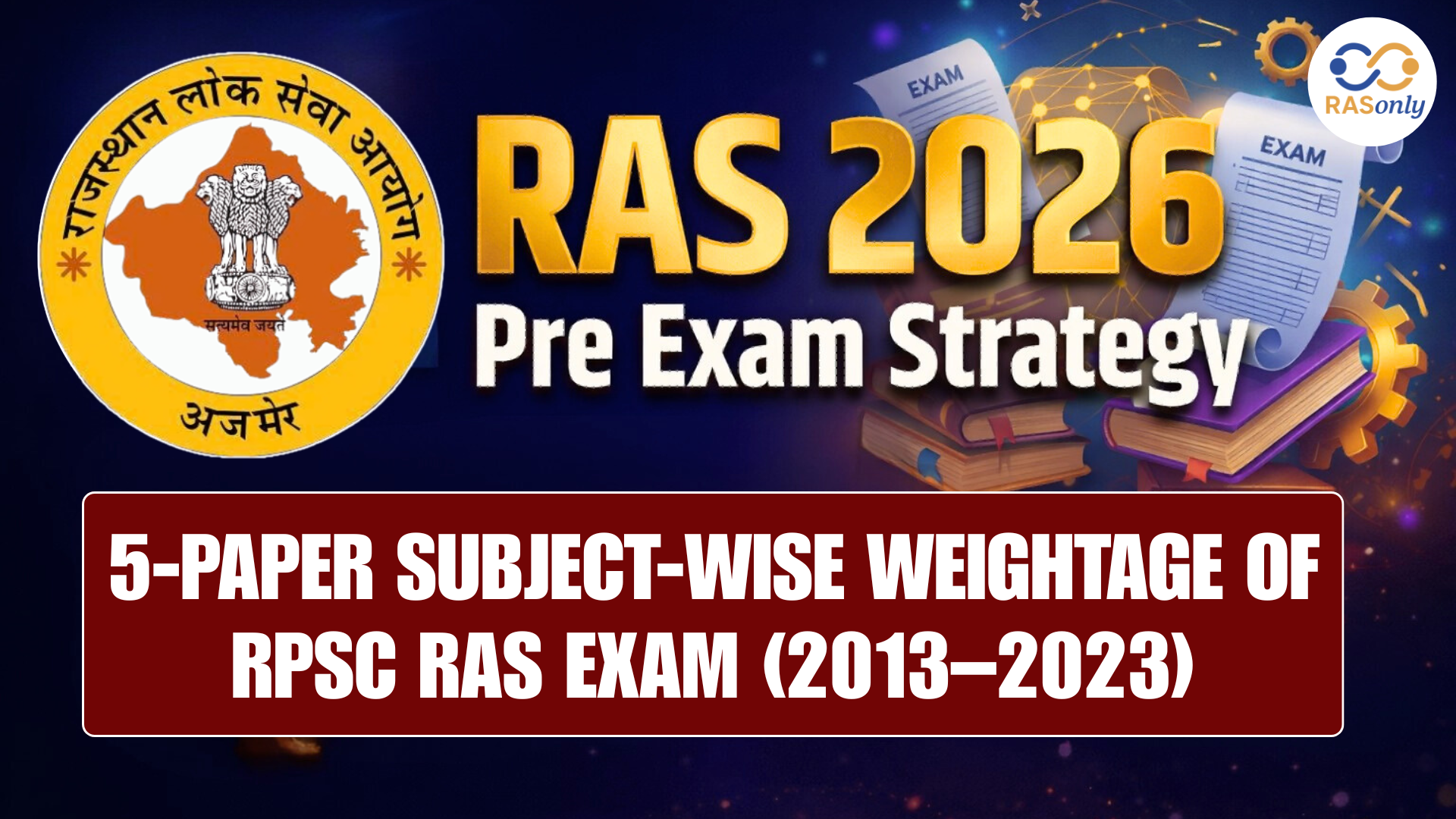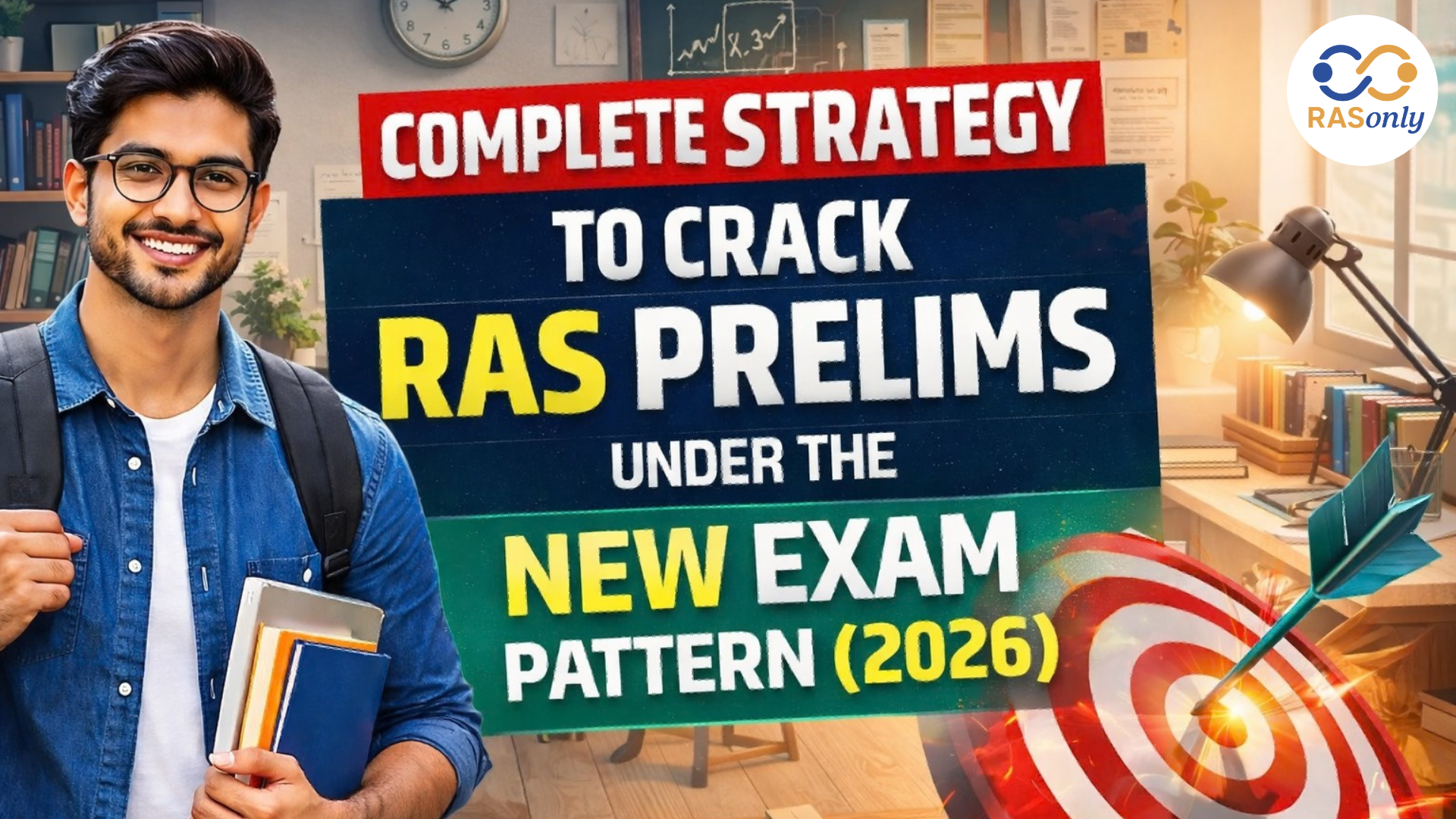RAS Prelims 2023 History & Culture Analysis: India, Rajasthan, and Art & Culture Breakdown
- >
- RAS Exam Analysis
- >
- Value Addition in RAS Mains: Subject-Wise Guide for High Scores
Value Addition in RAS Mains: Subject-Wise Guide for High Scores

Get in Touch with RASonly!

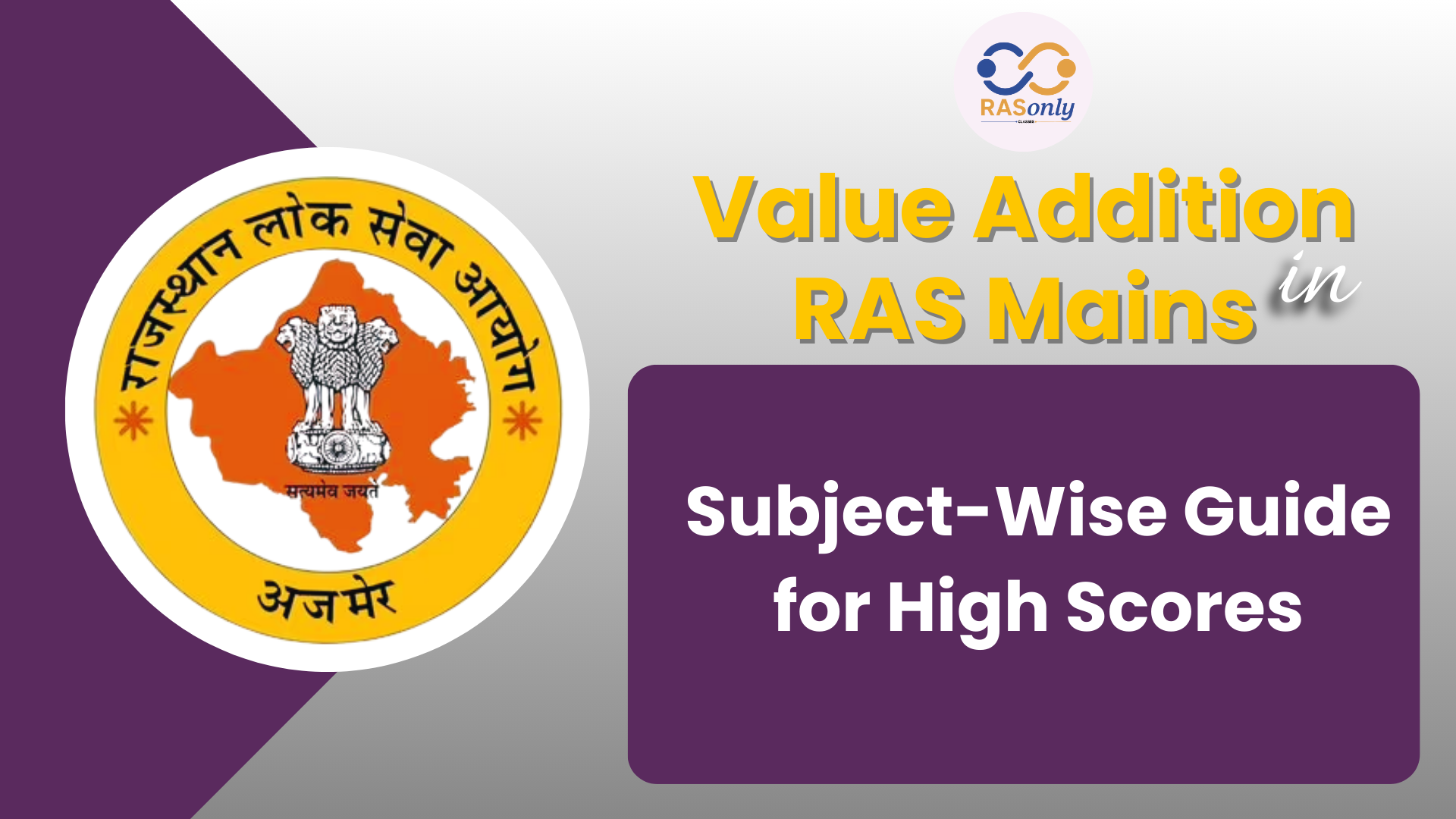
Rajasthan Administrative Service (RAS) Mains examination is not about simple memory of the learned content; but it requires clever synthesis and discussion skills hence proving the ability of the examinee to imitate administrative thinking. This blog highlights the aspect of value addition. Two examinees can be able to express the same substantive matter, but the one who uses empirical data specifically on Rajasthan, academic sources, legal provisions, and the cultural paradigm are likely to score a better mark.
The current text is a complete subject wise guide (topic-driven overview of value-enhancement tactics) to the RAS Mains with tabular formats, exemplary cases and practical scrutiny recommendations.
History & Culture
Why this subject for value addition?
The basis of the identity of Rajasthan lies in history and culture. These dimensions are encompassed in the Rajasthan Public Service Commission (RPSC) so that the future administrators can respect the heritage and also advance it but at the same time inherit modernization in the state.
Relevance: The General Studies -1 (GS-I) syllabus has direct questions on history and culture and essay subjects often reflect on the content. The use of Geographical Indication (GI) tags, folk arts, and associated policy frameworks is used to indicate a deep sense of state heritage.
| Value Addition Elements | Example Usage in RAS Mains |
|---|---|
| Rajasthan Handicraft Policy 2022 | “The policy aims to generate 50,000 jobs, revive dying arts, and promote e-marketing for artisans.” |
| GI Tags: Jodhpur Bandhej, Nathdwara Pichhwai | “GI tagging of Nathdwara Pichhwai reflects Rajasthan’s cultural diplomacy and heritage preservation.” |
| Folk Art: Jal Sanjhi, Phad painting, Lost Wax technique | “Jal Sanjhi art, a painting on water, reflects devotion and artistic innovation.” |
| Personalities: Amrita Devi Bishnoi | “Amrita Devi Bishnoi’s sacrifice to protect khejri trees is a model of environmental ethics.” |
Exam Tip: Link cultural topics with policies, GI tags, and personalities to stand out.
Geography
Why this subject for value addition?
The geography of Rajasthan defines the mode of agriculture, the water-management approach, and tourism planning. Examiners measure the ability to match physical features to the policy problems and challenges that accompany those attributes.
Relevance: Beneficial for GS‑I (physical geography, natural resources) and GS‑II (policy planning).
| Value Addition Elements | Example Usage |
|---|---|
| Desertification: 62% of Rajasthan’s land | “62% of Rajasthan’s land faces desertification due to overgrazing and water scarcity.” |
| Agriculture: 21% of India’s oilseeds | “Despite being a top producer, only 6% farmers access MSP benefits.” |
| Aravalli Range: ecological barrier | “Aravallis act as a natural wall, but illegal mining threatens them.” |
| Tourism Circuits | “Circuits like Jaipur–Udaipur–Jaisalmer boost state GDP and soft power.” |
Exam Tip: Draw simple maps of Rajasthan to impress examiners.
Indian Economy
Why this subject for value addition?
The issue of administration relates to the sphere of economy. Rajasthan Public Service Commission (RPSC) assesses the ability of candidates to use empirical economic data, government projects/ schemes and reform programs to develop practical solutions.
Relevancy: GS-III examination involves in-depth understanding of economic growth, agricultural economics, industrial growth and evaluation of the economic structure of Rajasthan.
| Value Addition Elements | Example Usage |
|---|---|
| Agriculture: 28.9% GVA share | “Agriculture remains Rajasthan’s backbone, employing 62% of its population.” |
| Schemes: PM-KUSUM, Beej Swalamban | “Solar pumps under PM-KUSUM reduce dependency on diesel irrigation.” |
| Committees: Swaminathan, Shanta Kumar | “Swaminathan recommended MSP = 1.5 × C2 cost.” |
| Challenges: Farmer indebtedness, food processing gaps | “52% of agricultural households indebted; food processing <10%.” |
Exam Tip: Quote Rajasthan’s Economic Review (latest year) for fresh statistics.
Polity & Constitution
Why this subject for value addition?
Polity makes you know laws, government and the citizens’ rights. Administrators should be legally savvy, and so RPSC is concerned with this.
Relevance: GS-II asks questions on governance, rights, and administration.
| Value Addition Elements | Example Usage |
|---|---|
| Rajasthan Right to Health Act (2023) | “Extends Article 21 by making healthcare a legal right.” |
| Panchayati Raj (1959) | “Rajasthan was the first state to implement PRIs.” |
| Commissions: Sarkaria, Punchhi | “Sarkaria stressed consultation—relevant in Centre–State disputes.” |
| Case Studies: MGNREGA social audits | “Social audits in Rajasthan uncovered irregularities, boosting accountability.” |
Exam Tip: Mention Articles and Amendments to add authority to answers.
International Relations
Why this subject for value addition?
Administrators have to think in a global manner. IR checks your awareness of India's foreign policy, global summits, and diplomacy.
Relevance: GS-II and essays are usually IR themes, and cultural and economic connections are luminous.
| Value Addition Elements | Example Usage |
|---|---|
| India’s G20 Presidency (2023) | “India’s theme echoed Vasudhaiva Kutumbakam.” |
| International Solar Alliance (ISA) | “India–France initiative headquartered in Gurugram.” |
| Voice of Global South Summit (2023) | “India positioned itself as a leader of developing nations.” |
| Cultural Diplomacy | “Showcasing Jal Sanjhi at G20 highlighted India’s soft power.” |
Exam Tip: Link Rajasthan’s culture with India’s diplomacy for multidimensional answers.
Science & Technology
Why this subject for value addition?
The officers of RAS are required to embrace digital governance. In this section, you will be tested on innovation, space, AI, and energy.
Relevance: GS-III focuses on tech applications in governance.
| Value Addition Elements | Example Usage |
|---|---|
| ISRO: Chandrayaan-3, Gaganyaan | “Showcases India’s low-cost, high-impact innovation.” |
| AI & Blockchain | “Blockchain tested in Rajasthan’s land records ensures transparency.” |
| National Hydrogen Mission | “Supports India’s Paris Climate commitments.” |
| Cybersecurity | “Essential as Digital India expands governance online.” |
Exam Tip: Always update with the latest ISRO missions or AI applications.
Sociology
Why this subject for value addition?
Sociology is essential because the administrators should know about caste, gender, and rural society. This section is important due to the social problems in Rajasthan which are unique.
Relevance: Useful for GS-I, GS-II, and essays on society.
| Value Addition Elements | Example Usage |
|---|---|
| Thinkers: Durkheim, Weber, Marx | “Durkheim’s solidarity explains caste bonds in Rajasthan villages.” |
| Issues: child marriage, literacy gaps | “High child marriage rates show structural inequality.” |
| Movements: Rajasthani Yuva Samiti | “Youth demand inclusion of Rajasthani in 8th Schedule.” |
| Gender: 10% women own land | “Land disparity reflects Marx’s inequality theory.” |
Exam Tip: Combine theory + Rajasthan example for powerful sociology answers.
Management
Why this subject for value addition?
The main role of administrators is that of the manager; RPSC examination tests the applicability of management theories in the governance setting.
Relevancy: such concepts are relevant to the GS-II components and case study analyses.
| Value Addition Elements | Example Usage |
|---|---|
| Maslow’s hierarchy | “Basic needs must be secured before empowerment programs work.” |
| Herzberg’s motivation theory | “Job satisfaction in civil services enhances efficiency.” |
| Weber’s bureaucracy | “Ensures rationality but risks rigidity.” |
| Leadership in governance | “Transformational leadership is crucial in disaster management.” |
Exam Tip: Quote management theories in governance essays for a unique edge.
Audit
Why this subject for value addition?
Audit guarantees responsibility and transparency. It is an aspect that is included in the RPSC to train officers in transparency.
Relevance: It is important in GS-IV (Ethics) and responses related to governance.
| Value Addition Elements | Example Usage |
|---|---|
| Social, Performance, Compliance Audits | “Social audits exposed fake MGNREGA beneficiaries in Rajasthan.” |
| RTI, Citizen’s Charter | “RTI empowers citizens to demand accountability.” |
| CAG Reports | “CAG ensures financial accountability of PSUs.” |
| Transparency & Probity | “Audit strengthens integrity in governance.” |
Exam Tip: Use Rajasthan’s social audits as real-world case studies.
Sports, Behaviour & Law
Why this subject for value addition?
Sport serves as a disciplinary channel, law maintains social order, and psychology of behaviour describes the workings of the human mind- all these areas make up holistic administrative systems.
Relevance: General Studies examinations cover sport policy, legal reform and the behavioural sciences.
| Value Addition Elements | Example Usage |
|---|---|
| Sports Policies: Khelo India | “Khelo India promotes grassroots participation, vital for Rajasthan’s youth.” |
| Behavioural Science: Emotional Intelligence | “EI helps administrators manage conflicts sensitively.” |
| Legal Frameworks: RTE, Right to Health | “Rajasthan’s RTH Act expands citizens’ rights under Article 21.” |
| Sports Personalities | “Apurvi Chandela inspires youth and highlights Rajasthan’s role in sports excellence.” |
Exam Tip: Add local athletes + behavioural theories to score higher.
Ethics
Why this subject for value addition?
Ethics relates to the ethos of the administration practice. Ethical considerations are taken into account by the Rajasthan Public Service Commission (RPSC) in order to assess moral judgment and integrity in governance.
Relevance: (GS-IV) focuses on practical examples and is an expression of age-old ethical values of Rajasthan.
| Value Addition Elements | Example Usage |
|---|---|
| Thinkers: Gandhi, Vivekananda, Buddha | “Buddha’s Middle Path reflects balanced decision-making in administration.” |
| Case Studies: Bishnoi Community | “Bishnois exemplify environmental ethics, protecting wildlife and forests.” |
| Principles: Integrity, Objectivity, Compassion | “A civil servant must uphold impartiality and compassion while delivering services.” |
| Quotes | “Earth provides enough for man’s needs, not his greed” – Gandhi. |
Exam Tip: Use Rajasthan-based ethical examples (like Bishnoi) for originality.
English (Essay & Language Papers)
Why this subject for value addition?
Essays discuss the ability to present ideas clearly; language papers require structure and novelty.
Relevance: An essay that is well organized with the use of quotations, contextual examples, and empirical data has greatly better results on assessment.
| Value Addition Elements | Example Usage |
|---|---|
| Quotations | “In governance essays, Ambedkar’s words on constitutional morality enrich arguments.” |
| Rajasthan Examples | “In environmental essays, the Bishnoi sacrifice is a unique illustration.” |
| Data & Reports | “Citing Rajasthan’s 28.9% agriculture GVA strengthens economic essays.” |
| Structure (Intro–Body–Conclusion) | “Multidimensional essays with data and culture references score higher.” |
Exam Tip: Begin essays with a quote and end with a visionary idea (Dr. Kalam, Gandhi, Ambedkar).
Conclusion
The syllabus Value addition forms the junction between preparation and achievement/success in the RAS Mains examination. The inclusion of state-specific schemes, theorists of influence, statistical information, and example case studies is used to show the mature approach that a potential administrator should take.
Remember:
- Knowledge is common.
- Value addition is rare.
- Examiners reward the rare.
Post Category
- RAS Salary
- Result
- RAS Admit Card
- RAS Job
- RAS Cutoff
- Preparation Tips
- RAS Answer Key
- RAS Exam Analysis
- RAS Syllabus
- RAS Previous Year Papers
- RPSC RAS Exam Pattern
- RAS Interview
- RAS Mains Exam Date
- RAS Vacancy
- RAS Test Series
- RAS Best Books
- RAS Preparation Resources
- RAS Coaching Centre
- History
- Polity
- Geography
- Economics
- Science
- Art and Culture
- RPSC RAS Application Form
- RPSC RAS Notification
RASonly Interview Guidance Program

Mr. Ashok Jain
Ex-Chief Secretary Govt of Rajasthan
- IAS officer of the 1981 batch, Rajasthan cadre.
- Passionate about mentoring the next generation of RAS officers with real-world insights.
- Got retired in Dec 2017 from the post of Chief Secretary of the state of Rajasthan.

Mr. Guru Charan Rai
Ex-ASP / SP in Jaisalmer
- Guru Charan Rai, IPS (Retd), retired as Inspector General of Police (Security), Rajasthan, Jaipur in 2017.
- Served as ASP and SP in Jaisalmer, Nagaur, Sri Ganganagar, Sawai Madhopur, Dausa, Sikar, and Karauli.
- He also held key positions as DIGP and IGP in the Law and Order division.

Mr. Rakesh Verma
Ex-IAS Officer, B.Tech, MBA, and M.A. (Economics)
- IAS officer of the 1981 batch and retired in Chief Secretary Rank.
- Civil servant of high repute and vast experience.
- Has been teaching UPSC CSE subjects for the last six years.
Related Post
Daily Current Affairs for RAS Exam Preparation 2026
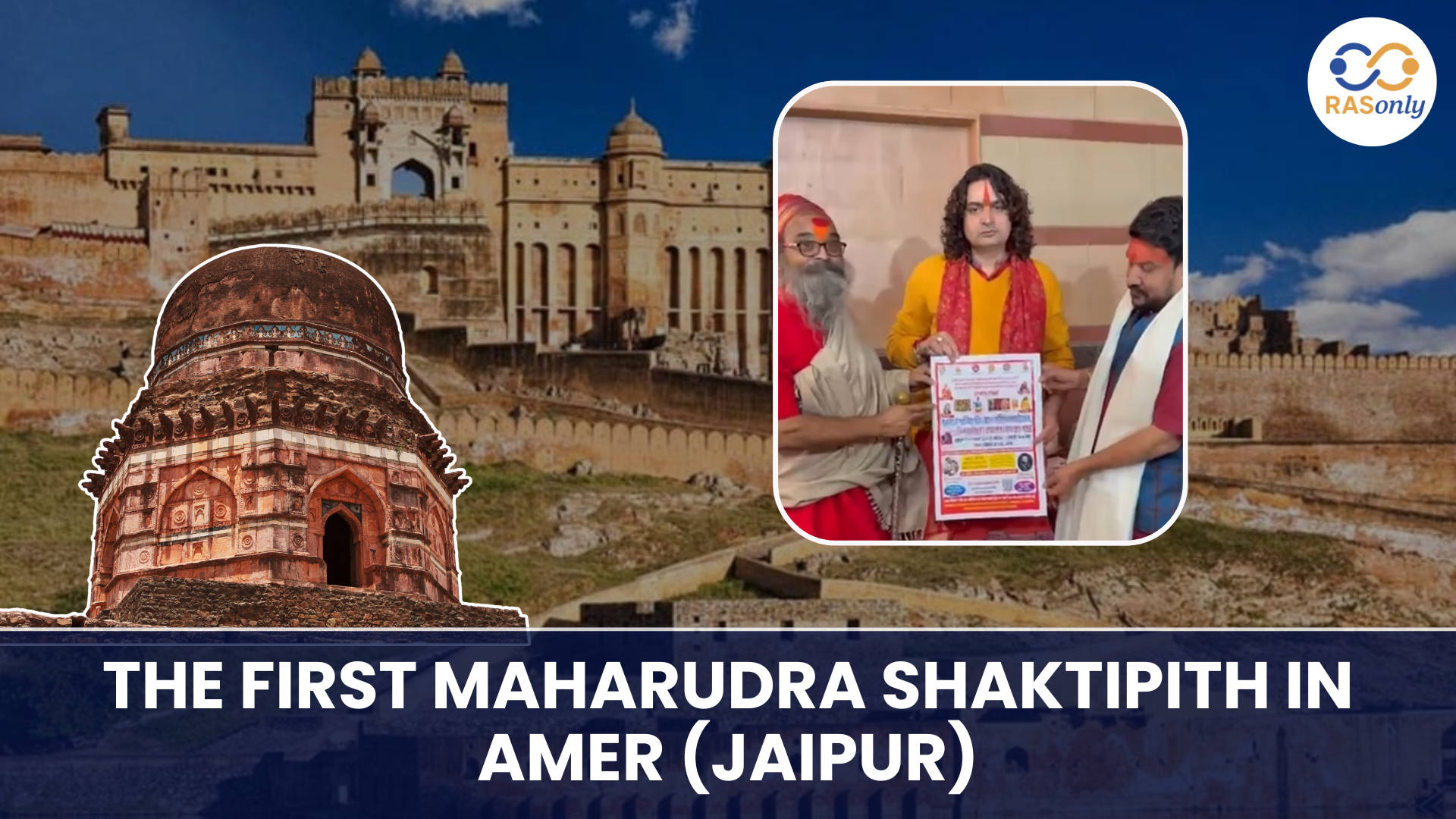
First Maharudra Shaktipith to Be Established in Jaipur
January 27, 2026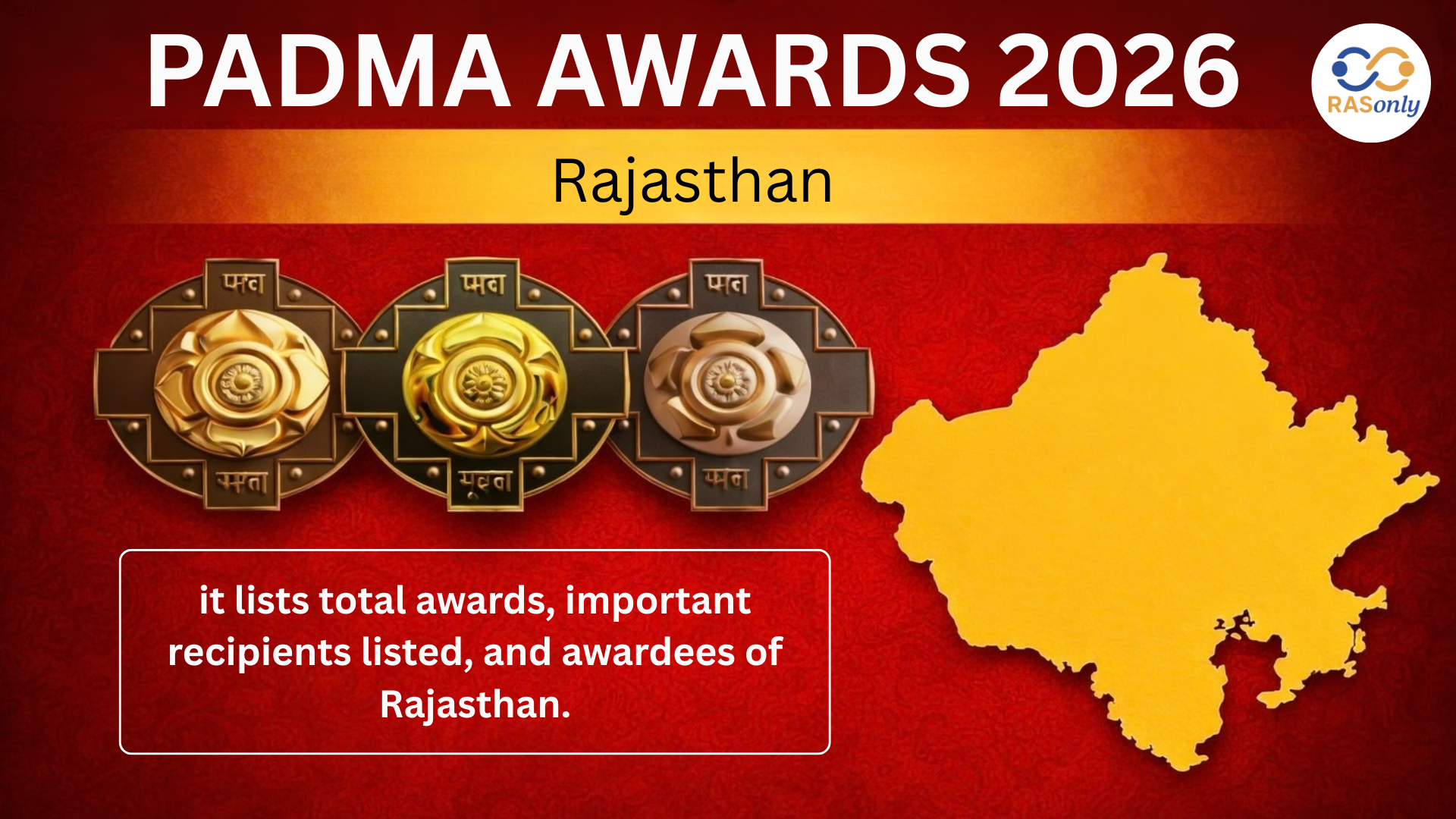
Padma Awards 2026: List, Numbers and Rajasthan Winners
January 27, 2026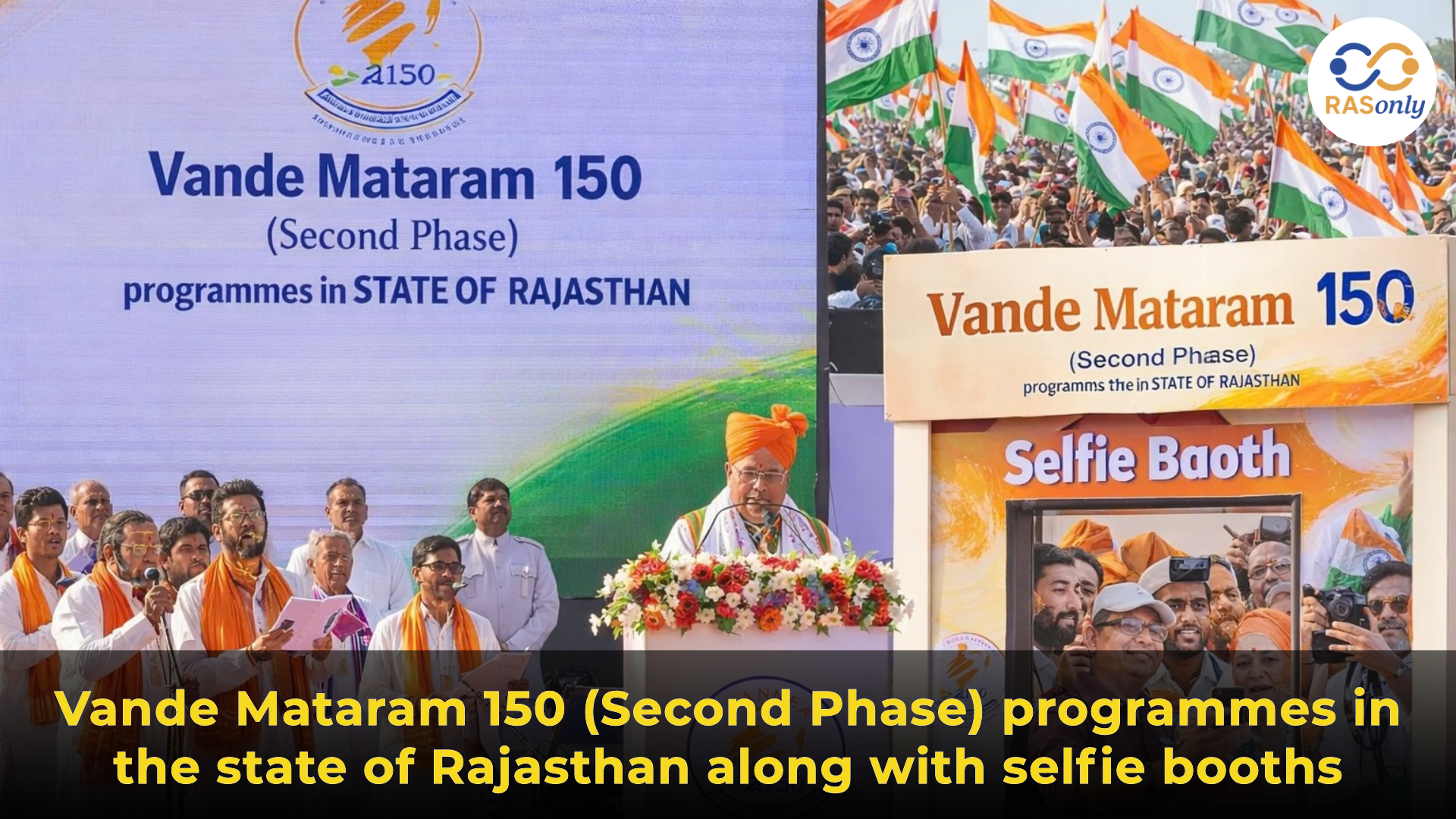
Vande Mataram 150 Second Phase Launched in Rajasthan
January 27, 2026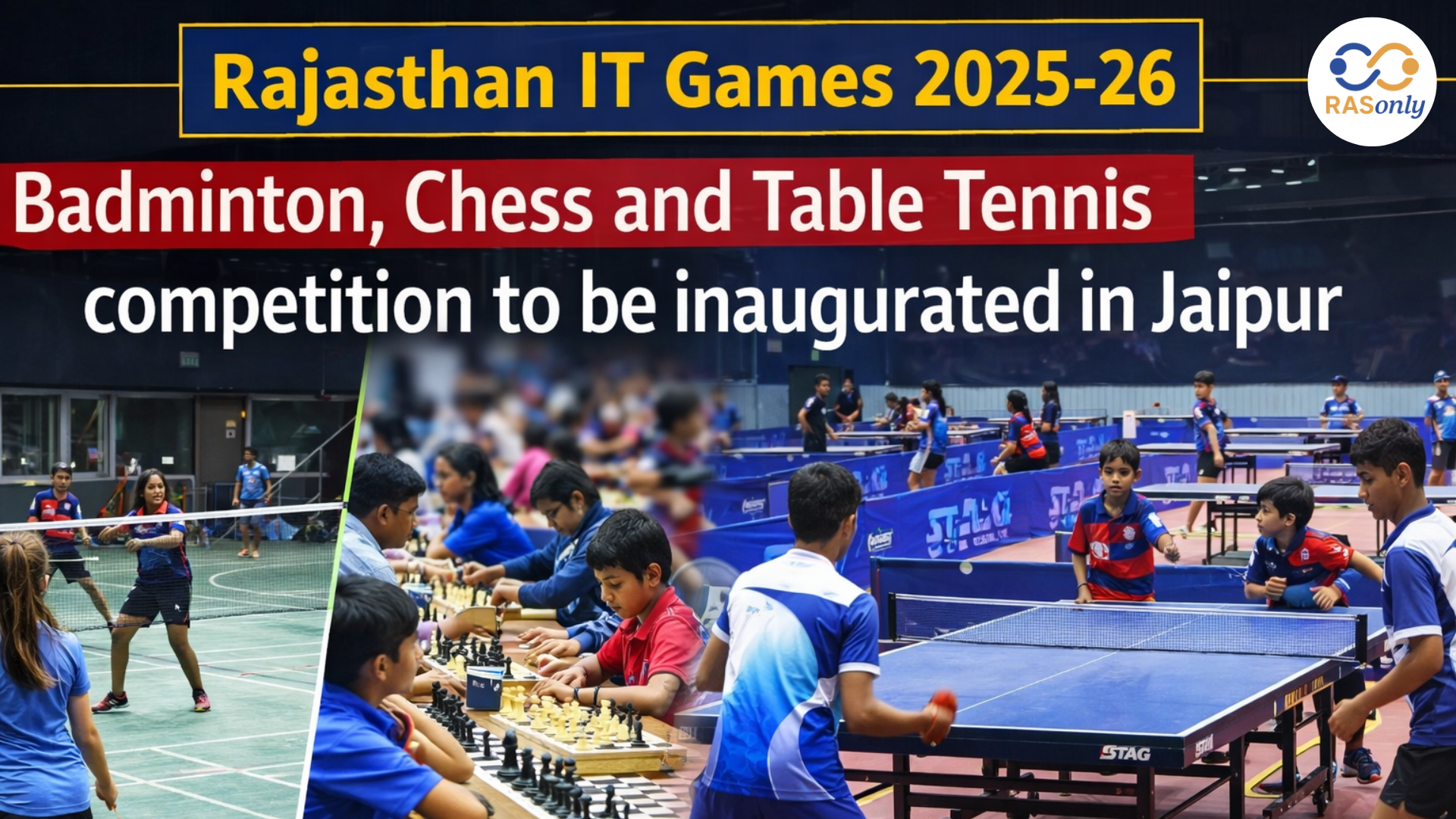
Rajasthan IT Games 2025-26 Launched in Jaipur
January 27, 2026👉🏻 Register Today to Join Classes! 👍🏻
- Team RASOnly -
🎯 Benefits of RASOnly Coaching:
- ✅ 1:1 Mentorship with RAS Officers
- ✅ Experienced and Expert Faculty
- ✅ Free Library Access
- ✅ Daily Minimum 4 Hours Must
- ✅ Comprehensive Study Material
- ✅ Regular Tests & Performance Analysis
- ✅ Personalized Guidance & Doubt Solving
- ✅ Online & Offline Class Options
- ✅ Affordable Fees with Quality Education
Key Highlights:
- 👉🏻 3-Day Refund Policy
- 👉🏻 New Batch Starting from 04 August
- 👉🏻 Registration Amount: Only ₹1000




